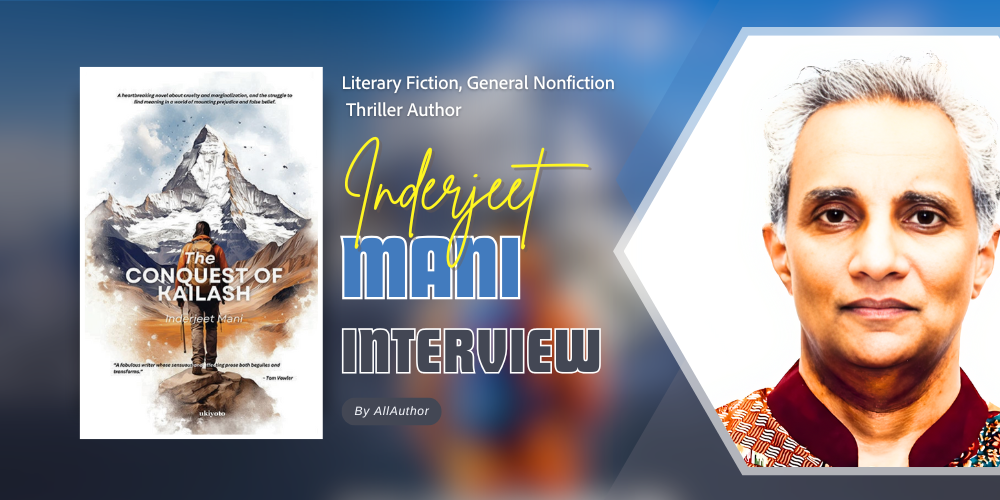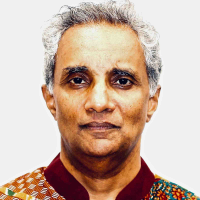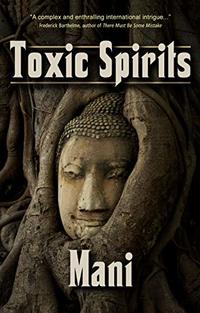Inderjeet Mani Interview Published on: 02, Jan 2025
 Can you share your journey from being a professor and scientist to becoming a novelist? What inspired this transition?
Can you share your journey from being a professor and scientist to becoming a novelist? What inspired this transition?
I was always writing stories and essays, but didn't have time to take on novel-writing. We all want to integrate different parts of ourselves into a whole, and at some point I couldn't neglect my writerly self any more as it started to take over.
Your novel Toxic Spirits draws from your experiences in Thailand’s Golden Triangle. How did your time volunteering with hill-tribes shape the narrative and themes of the book?I retired to Thailand in 2008 to write. Although I had more time to write, I didn’t really find myself retiring. I instead worked as a volunteer teacher of math in the early 2000s with hill tribe children in the mountains near Chiang Rai. Communication was a challenge due to language differences and social background, so I had to use more visual and grounded methods, but luckily many were gifted students. Their families called their mountains home, and they’d lived there for half a century or more, but they were treated as outsiders by the Thais, and weren’t given Thai citizenship. I’ve always been drawn to the marginalized, and so I found them to be very interesting.
I was also close friends with Dr. Otome Klein Hutheesing, a well-known Chiang Mai-based Dutch anthropologist, who introduced me to the Lisu tribe and one of their shamans. Herbal medicines was widely used by the Lisu and other tribes, living as they did in a botanically very rich environments, learning through trial and error which plants were helpful or harmful. While relaxing in a circular Lisu hut with Otome, I came across an article in The Independent that discussed Indian tribals being exploited by drug companies for clinical trials. I couldn’t help wondering how such medical mischief and injustice might extend to tribals in Thailand, and thus a novel about healing was born.
In The Conquest of Kailash, what key themes or messages are you hoping to convey to your readers?My writing has grown a bit more political over time, and this novel is about cruelty and marginalization, and the struggle to find meaning in a world of mounting prejudice and false belief. It was written as a response to the horrible rise of religious intolerance and anti-Muslim discrimination in India, as well as a tour I did of ancient Buddhist sites there. Writers have a duty to themselves, and this includes placing oneself and the quest for meaning in the current historical moment.
As an author who has published both fiction and scientific papers, how do you approach writing in these different genres? Do you find that one influences the other?It goes back to integrating different sides of myself. In fact, I've just finished writing a book on Storytelling and Generative AI (that's ChatGPT etc.).
You have received numerous awards for your short stories and novels. What do these accolades mean to you as a writer?It's nice to get some recognition, but for every award there are dozens of rejections. Overall, writers have to push on no matter as it is up to us to keep shining a light.
Could you tell us about your writing process? Do you have any specific routines or rituals that help you get into the flow of writing?For stories and poems, I just write on a whim, but with book projects it's much more organized with particular plans, maps, diagrams, etc.
What challenges did you face while writing The Conquest of Kailash, and how did you overcome them?I had to expose a lot of wounds, sharing much more information than I would have with friends and family. That left me a bit broken along the way....
You have written a significant number of literary pieces. How do you choose which stories to expand into longer works, like novels?My novels have independent origins, rather than growing from short stories. But they all come from images and phrases that emerge and then call out from the depths of the unconscious.
What role does your cultural background play in your writing? How do you incorporate elements of your Indian heritage into your work?My Indian heritage informs everything I do, even though I lived in India only for seven years and left the country in 1975. I don’t really fit in that well into contemporary India, but I am a fan of Indian civilization. I’ve also done translations of poetry from multiple Indian languages.
Can you discuss your scholarly work, particularly The Imagined Moment? How does your academic research intersect with your creative writing?See my earlier answer about integrating different parts of myself. The Imagined Moment is about time in narrative, and as such integrates storytelling and literary theory. I got into this because at work we were trying to develop software to resolve time expressions in messages and news articles, and that led to my developing software to track events, narrative tempo, and characters in time, and this led in turn to using computers to model plots for automatic story understanding and generation.
How do you select the literary magazines and anthologies in which you want to publish your shorter works? What is your approach to submitting to these publications?I search through various sites, like submittable, duotrope, etc.
As someone who has written extensively about both narrative and time, how do you perceive the relationship between time and storytelling in your own work?With novels it's very important for a writer to keep track of the clock, though some famous writers have been inconsistent. The clock is also important for the reader, to make sure the reader can be cued as to how much time has elapsed between events, and make sure that any jumps in time are such that they minimize cognitive load on the user, and so that the variations in narrative pace are sensible and in tune with the structure of the story.
What advice would you give to aspiring authors who are looking to blend personal experiences into their fictional narratives?In fiction, you don't have to write only what you know, as you don't really know other people's lives intimately. But you do have to sound plausible, and for that you have to rely on your personal experiences and feelings.
What projects are you currently working on, and what can readers expect from you in the future?I've also been writing science fiction and fantasy stories and also some historical fiction that looks at colonialism and evolution. Finally, I'm writing some non-fiction about my father's experiences in WW2.
How were you introduced to AllAuthor and would you say that this website has been helpful?Yes, it has been helpful, though I don't have any real numbers.
Share Inderjeet Mani's interview
Inderjeet Mani is an Indian-born former U.S. professor and scientist, now based primarily in Thailand. An award-winning author, Mani has published seven novels, six scholarly books, and nearly fifty shorter literary works featured in literary magazines, anthologies, and newspapers. He has earned numerous accolades, such as the WIND Magazine Short Fiction Award, Story South’s Million Writers Award Notable Stories, and finalist honors for the Nimrod Katherine Anne Porter Prize and the Pan Literary Award.



